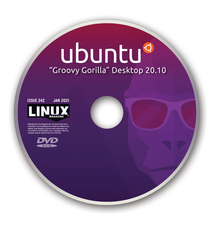On the DVD
On the DVD

Ubuntu 20.10 "Groovy Gorilla" and Fedora 33 Workstation
Ubuntu 20.10 "Groovy Gorilla"
Codenamed Groovy Gorilla, Ubuntu 20.10 is the latest release in the popular desktop distribution. A short-term release, it will be supported for nine months until July 2021, with an easy upgrade path to the next release. The next Long Term Support (LTS) release is not scheduled until April 2021.
Like all Ubuntu releases, Groovy Gorilla draws many of its packages from the Debian Unstable repository. In keeping with the tradition for short-term releases, it contains no major innovations. However, Groovy Gorilla does include one or two new features that might interest the curious. Chief among these are WiFi sharing through the use of QR codes. In addition, should you like what you see on the DVD, you might try Groovy Gorilla as a desktop on a 4MB or 8MB Raspberry Pi.
Other noteworthy features are included thanks to the shipping of Gnome 3.38. For instance, users can now manually drag and drop icons. When more than nine icons are present in a folder, pagination keeps them from taking up room. Several new features center on the message tray, where upcoming calendar events now display below the calendar widget in the message tray and a battery indicator and reboot option now appear.
[...]
Buy this article as PDF
(incl. VAT)
Buy Linux Magazine
Subscribe to our Linux Newsletters
Find Linux and Open Source Jobs
Subscribe to our ADMIN Newsletters
Support Our Work
Linux Magazine content is made possible with support from readers like you. Please consider contributing when you’ve found an article to be beneficial.

News
-
New Linux Botnet Discovered
The SSHStalker botnet uses IRC C2 to control systems via legacy Linux kernel exploits.
-
The Next Linux Kernel Turns 7.0
Linus Torvalds has announced that after Linux kernel 6.19, we'll finally reach the 7.0 iteration stage.
-
Linux From Scratch Drops SysVinit Support
LFS will no longer support SysVinit.
-
LibreOffice 26.2 Now Available
With new features, improvements, and bug fixes, LibreOffice 26.2 delivers a modern, polished office suite without compromise.
-
Linux Kernel Project Releases Project Continuity Document
What happens to Linux when there's no Linus? It's a question many of us have asked over the years, and it seems it's also on the minds of the Linux kernel project.
-
Mecha Systems Introduces Linux Handheld
Mecha Systems has revealed its Mecha Comet, a new handheld computer powered by – you guessed it – Linux.
-
MX Linux 25.1 Features Dual Init System ISO
The latest release of MX Linux caters to lovers of two different init systems and even offers instructions on how to transition.
-
Photoshop on Linux?
A developer has patched Wine so that it'll run specific versions of Photoshop that depend on Adobe Creative Cloud.
-
Linux Mint 22.3 Now Available with New Tools
Linux Mint 22.3 has been released with a pair of new tools for system admins and some pretty cool new features.
-
New Linux Malware Targets Cloud-Based Linux Installations
VoidLink, a new Linux malware, should be of real concern because of its stealth and customization.
